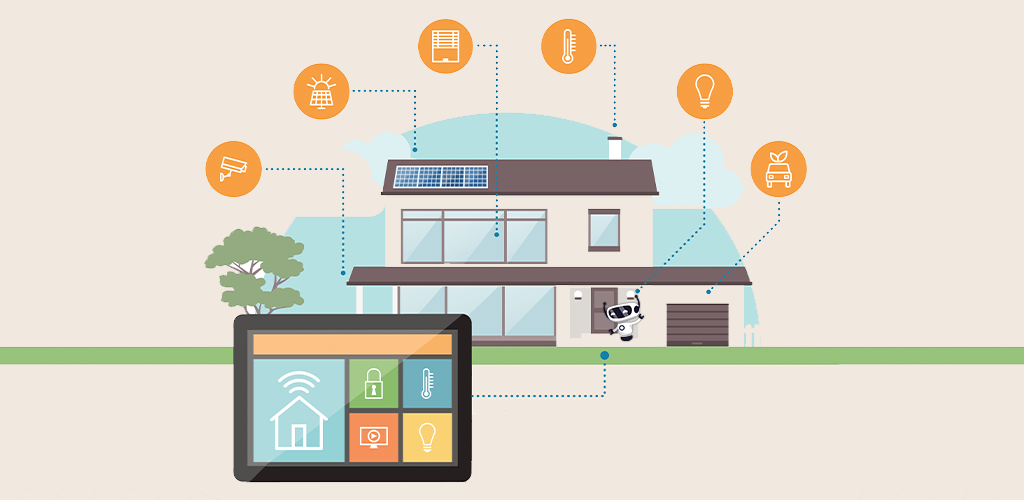April 8, 2021
The Internet of Things: An Explanation and Some Safety Tips
Posted by kevin

In its broadest sense, the term “Internet of Things” (or IoT), describes any device with a built-in computer that can connect to the internet. This definition includes some of the technologies core to our day-to-day lives, including our smartphones, tablets, and laptops. Recently, however, the term is coming to be used in a more specific way, and includes any internet-connected device that shares data with other devices. You’ve probably heard of them referred to by their more common name, “smart devices.” Although they tend to make everyday activities easier, because they’re connected to the internet, they can also be hacked. Here’s HotBot’s explanation of the Internet of Things, as well as some tips for making these devices safer:
- How do IoT devices work?
- List of IoT devices
- Tips for IoT safety
How Do IoT Devices Work?
You can describe Internet of Things devices as mini-computers built around sensors and processors. They use the internet to provide you with their services and typically connect to your other devices (like your smartphone). When connected, these devices collect data and use that data to make the service better for you. For example, your fitness tracker collects data about your walking habits, then may send you workout recommendations, reminders to get in extra steps, and more. In general, the purpose of these devices is to make your life more convenient, and even controllable from a distance.
List of IoT Devices
A few smart devices automatically come to mind when thinking of the Internet of Things. They include fitness trackers, smart thermostats, and more. Some IoT devices include:
- Home assistants
- Fitness trackers
- Internet-connected home security, like video cameras and doorbells
- Smart appliances
- Medical devices (like some pacemakers)
- Controllable light bulbs and switches
Some of the most popular IoT devices include Google’s Nest Assistant, the Amazon Firestick, FitBits, Ring Doorbells, and Philips Hue lightbulbs.
Tips for IoT Safety
Although IoT devices make our lives easier, there’s always a risk when we open ourselves up to the internet. The more connected we are, the greater the risk. Hackers can potentially sneak into your home security cameras, wearable technology can track your whereabouts, and if someone wants to be petty, smart bulb hacks can annoy you with lights constantly shutting on and off.
Fortunately, you can protect yourself and your IoT devices with a few tips:
- Protect your router. Your wi-fi network transfers most of your IoT data. If you don’t secure that network, hackers can access it and all the data on it. While most people password protect their router (and thus access to their wi-fi), that might not be enough anymore. In addition, you should consider protecting your entire network with a VPN, which in turn keeps all of your IoT devices safe as well.
- Turn off location tracking. Many of the IoT devices you carry on you at all times (like fitness trackers, smartwatches, and more) get valuable data out of tracking your exact location. Unfortunately, this data is often sent back to the company behind the tech, which makes them money. In addition, if your devices are hacked, complete strangers could track your location as well. You can reduce this risk by turning location tracking off when you don’t need it.
- Strengthen your account security. You can access the services of most IoT devices through password protected apps. However, if you use a weak password, hackers may be able to get into the account and wreak havoc with it. You can use these tips to create stronger passwords for all your accounts.
We use the Internet of Things for, well, just about everything. But when the internet connects everything, we risk our privacy and security. By understanding IoT devices, and how to protect them, you can also protect yourself.
Posted by kevin
More Blog Posts
February 14, 2023
How the Investigatory Powers Act Impacts Citizen Privacy
In 2016, the United Kingdom passed the Investigatory Powers Act or IP Act, into law. This act empowered the government and related agencies to access and collect citizen data, without consent. Critics immediately slammed the new law. The media dubbed it the “Snoopers’ Charter.” Meanwhile, Edward Snowden described the act as “the most extreme surveillance […] Read moreFebruary 14, 2023
How to Easily Unblock Wikipedia with HotBot VPN
Wikipedia puts a wealth of information at your fingertips. Everything from the biography of Alexander Graham Bell to the basics of quantum computing can be instantly opened by curious browsers. But what happens when you can’t access that information? Whether a business network blocks it or a particular country censors it, don’t let that slow […] Read moreFebruary 14, 2023

